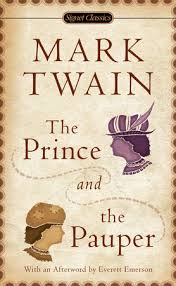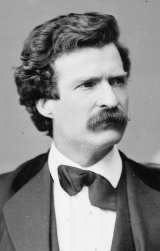The Prince and the Pauper Page #17
The Prince and the Pauper is a novel by American author Mark Twain. It was first published in 1881 in Canada, before its 1882 publication in the United States. The novel represents Twain's first attempt at historical fiction.
“The name has escaped my memory. Go on--tell me thy story.” “‘Tis not much, your Majesty, yet perchance it may beguile a short half-hour for want of a better. My father, Sir Richard, is very rich, and of a most generous nature. My mother died whilst I was yet a boy. I have two brothers: Arthur, my elder, with a soul like to his father’s; and Hugh, younger than I, a mean spirit, covetous, treacherous, vicious, underhanded--a reptile. Such was he from the cradle; such was he ten years past, when I last saw him--a ripe rascal at nineteen, I being twenty then, and Arthur twenty-two. There is none other of us but the Lady Edith, my cousin--she was sixteen then--beautiful, gentle, good, the daughter of an earl, the last of her race, heiress of a great fortune and a lapsed title. My father was her guardian. I loved her and she loved me; but she was betrothed to Arthur from the cradle, and Sir Richard would not suffer the contract to be broken. Arthur loved another maid, and bade us be of good cheer and hold fast to the hope that delay and luck together would some day give success to our several causes. Hugh loved the Lady Edith’s fortune, though in truth he said it was herself he loved--but then ’twas his way, alway, to say the one thing and mean the other. But he lost his arts upon the girl; he could deceive my father, but none else. My father loved him best of us all, and trusted and believed him; for he was the youngest child, and others hated him--these qualities being in all ages sufficient to win a parent’s dearest love; and he had a smooth persuasive tongue, with an admirable gift of lying--and these be qualities which do mightily assist a blind affection to cozen itself. I was wild--in troth I might go yet farther and say very wild, though ‘twas a wildness of an innocent sort, since it hurt none but me, brought shame to none, nor loss, nor had in it any taint of crime or baseness, or what might not beseem mine honourable degree. “Yet did my brother Hugh turn these faults to good account--he seeing that our brother Arthur’s health was but indifferent, and hoping the worst might work him profit were I swept out of the path--so--but ’twere a long tale, good my liege, and little worth the telling. Briefly, then, this brother did deftly magnify my faults and make them crimes; ending his base work with finding a silken ladder in mine apartments--conveyed thither by his own means--and did convince my father by this, and suborned evidence of servants and other lying knaves, that I was minded to carry off my Edith and marry with her in rank defiance of his will. “Three years of banishment from home and England might make a soldier and a man of me, my father said, and teach me some degree of wisdom. I fought out my long probation in the continental wars, tasting sumptuously of hard knocks, privation, and adventure; but in my last battle I was taken captive, and during the seven years that have waxed and waned since then, a foreign dungeon hath harboured me. Through wit and courage I won to the free air at last, and fled hither straight; and am but just arrived, right poor in purse and raiment, and poorer still in knowledge of what these dull seven years have wrought at Hendon Hall, its people and belongings. So please you, sir, my meagre tale is told.” “Thou hast been shamefully abused!” said the little King, with a flashing eye. “But I will right thee--by the cross will I! The King hath said it.” Then, fired by the story of Miles’s wrongs, he loosed his tongue and poured the history of his own recent misfortunes into the ears of his astonished listener. When he had finished, Miles said to himself-- “Lo, what an imagination he hath! Verily, this is no common mind; else, crazed or sane, it could not weave so straight and gaudy a tale as this out of the airy nothings wherewith it hath wrought this curious romaunt. Poor ruined little head, it shall not lack friend or shelter whilst I bide with the living. He shall never leave my side; he shall be my pet, my little comrade. And he shall be cured!--ay, made whole and sound--then will he make himself a name--and proud shall I be to say, ‘Yes, he is mine--I took him, a homeless little ragamuffin, but I saw what was in him, and I said his name would be heard some day--behold him, observe him--was I right?’” The King spoke--in a thoughtful, measured voice-- “Thou didst save me injury and shame, perchance my life, and so my crown. Such service demandeth rich reward. Name thy desire, and so it be within the compass of my royal power, it is thine.” This fantastic suggestion startled Hendon out of his reverie. He was about to thank the King and put the matter aside with saying he had only done his duty and desired no reward, but a wiser thought came into his head, and he asked leave to be silent a few moments and consider the gracious offer--an idea which the King gravely approved, remarking that it was best to be not too hasty with a thing of such great import. Miles reflected during some moments, then said to himself, “Yes, that is the thing to do--by any other means it were impossible to get at it--and certes, this hour’s experience has taught me ’twould be most wearing and inconvenient to continue it as it is. Yes, I will propose it; ’twas a happy accident that I did not throw the chance away.” Then he dropped upon one knee and said-- “My poor service went not beyond the limit of a subject’s simple duty, and therefore hath no merit; but since your Majesty is pleased to hold it worthy some reward, I take heart of grace to make petition to this effect. Near four hundred years ago, as your grace knoweth, there being ill blood betwixt John, King of England, and the King of France, it was decreed that two champions should fight together in the lists, and so settle the dispute by what is called the arbitrament of God. These two kings, and the Spanish king, being assembled to witness and judge the conflict, the French champion appeared; but so redoubtable was he, that our English knights refused to measure weapons with him. So the matter, which was a weighty one, was like to go against the English monarch by default. Now in the Tower lay the Lord de Courcy, the mightiest arm in England, stripped of his honours and possessions, and wasting with long captivity. Appeal was made to him; he gave assent, and came forth arrayed for battle; but no sooner did the Frenchman glimpse his huge frame and hear his famous name but he fled away, and the French king’s cause was lost. King John restored De Courcy’s titles and possessions, and said, ‘Name thy wish and thou shalt have it, though it cost me half my kingdom;’ whereat De Courcy, kneeling, as I do now, made answer, ‘This, then, I ask, my liege; that I and my successors may have and hold the privilege of remaining covered in the presence of the kings of England, henceforth while the throne shall last.’ The boon was granted, as your Majesty knoweth; and there hath been no time, these four hundred years, that that line has failed of an heir; and so, even unto this day, the head of that ancient house still weareth his hat or helm before the King’s Majesty, without let or hindrance, and this none other may do. {3} Invoking this precedent in aid of my prayer, I beseech the King to grant to me but this one grace and privilege--to my more than sufficient reward--and none other, to wit: that I and my heirs, for ever, may sit in the presence of the Majesty of England!”
Translation
Translate and read this book in other languages:
Select another language:
- - Select -
- 简体中文 (Chinese - Simplified)
- 繁體中文 (Chinese - Traditional)
- Español (Spanish)
- Esperanto (Esperanto)
- 日本語 (Japanese)
- Português (Portuguese)
- Deutsch (German)
- العربية (Arabic)
- Français (French)
- Русский (Russian)
- ಕನ್ನಡ (Kannada)
- 한국어 (Korean)
- עברית (Hebrew)
- Gaeilge (Irish)
- Українська (Ukrainian)
- اردو (Urdu)
- Magyar (Hungarian)
- मानक हिन्दी (Hindi)
- Indonesia (Indonesian)
- Italiano (Italian)
- தமிழ் (Tamil)
- Türkçe (Turkish)
- తెలుగు (Telugu)
- ภาษาไทย (Thai)
- Tiếng Việt (Vietnamese)
- Čeština (Czech)
- Polski (Polish)
- Bahasa Indonesia (Indonesian)
- Românește (Romanian)
- Nederlands (Dutch)
- Ελληνικά (Greek)
- Latinum (Latin)
- Svenska (Swedish)
- Dansk (Danish)
- Suomi (Finnish)
- فارسی (Persian)
- ייִדיש (Yiddish)
- հայերեն (Armenian)
- Norsk (Norwegian)
- English (English)
Citation
Use the citation below to add this book to your bibliography:
Style:MLAChicagoAPA
"The Prince and the Pauper Books." Literature.com. STANDS4 LLC, 2024. Web. 26 Dec. 2024. <https://www.literature.com/book/the_prince_and_the_pauper_315>.




Discuss this The Prince and the Pauper book with the community:
Report Comment
We're doing our best to make sure our content is useful, accurate and safe.
If by any chance you spot an inappropriate comment while navigating through our website please use this form to let us know, and we'll take care of it shortly.
Attachment
You need to be logged in to favorite.
Log In